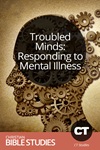The first three-quarters of the sanctuary were occupied by people who had attended the church for years, stretching back to their days in Sunday school. Over the years the church settings had changed—from classroom to youth group room to traditional worship service to contemporary worship service and now the Sunday night postmodern worship gathering—but the seating arrangement had remained the same. They sat in their well- established groups of friends, as comfortable as they were in their own homes with their own families. In the last quarter of the room were a few rows of solitary stragglers, spaced out by an empty seat or two in between. These people were visitors or, in some cases, regulars who had not been attending since birth. They were drawn to worshiping God in a postmodern language that they understood, but they were wary of the rigid social boundaries.
At the time of Communion, the pastor said there would be an experimental new format for taking the sacrament. He explained that the Lord's Supper is not an individual act but a corporate meal in which we celebrate together the meaning of Jesus' death. Therefore, instead of coming up to the front one at a time to partake of the elements, people would come up in groups and celebrate Communion together. He instructed them to choose their own groups, from the people situated around them, and to assemble at the table when they were formed.
My friend Sarah, an introvert who attends frequently, sat in the second-to-last row. After hearing these directions, she stood up, in extreme social discomfort, and walked out of the sanctuary. Sarah is an ordained Presbyterian minister.
Excluding Introverts from Worship
A 2006 article by Mandy Smith in Christian Standard presented this chilling scenario:
Imagine hearing the following at the opening of your next church service:
Welcome! We're going to worship the Lord in spirit and in truth today. So let's strip off all encumbrances by removing our shoes, socks, and accessories. Now, grab someone new and give them a hug. Go on, don't be shy. In fact, the Bible tells us to greet one another with a holy kiss! Now, empty out the contents of your pockets and purses and form small groups to examine them together. Open up to those around you. Tell them your fears and weaknesses so you can feel the love of your Christian family.
And all the introverts cringed together.
Though the author obviously writes with hyperbole, her point is well grounded: the culture and practices of evangelical worship services can be painfully unpleasant for some people, even those who are wholeheartedly devoted to Christ and his mission. The familiarity and informality of some churches in the evangelical tradition, with their best intentions of devotion and hospitality, can actually exclude introverts. Times of greeting and sharing in a public context, especially with strangers or distant acquaintances, are unnatural and sometimes painfully uncomfortable. In fact, some introverts I interviewed conceded that they commonly show up late on Sundays to avoid the awkward pre-service socializing and greeting times.
Researching Worship Styles
As part of my research, I attended several churches of varying denominations, sizes, and worship styles—though most of them identified with the evangelical tradition. I visited a colossal megachurch with a professional and polished service, an alliterative three-point sermon, and an eye for seekers. I attended a small Quaker church, with a wall of windows behind the pulpit, which looked out on the San Gabriel Mountains. I visited a traditional and echoing Episcopalian church, an evensong, a meditative Taize service, many contemporary services at carpeted Presbyterian churches, and three postmodern worship gatherings bursting at the seams with young people.
My most disappointing worship experience took place at a large church that has quadrupled in six years, their numbers swelled by college students and 20-somethings. At 30, I was anticipating a service that communicated the gospel in a familiar language. We lined up at the door before the service started as if waiting for a bouncer to check our names off the list and open the velvet ropes. After getting cleared to enter, I sat down on my folding chair, where I was inundated with blaring music, flashing colored lights, floating images, and rolling PowerPoint announcements on numerous screens around the room, and the loud chatter of young adults laughing and flirting. Clearly this was not a time for silent prayer. At the start of the service, the scream of the electric guitar caused everyone to leap out of his or her chair. For the next 30 minutes people clapped and danced and cheered their way through a frenetic worship set.
After an extended announcement time, the pastor preached a long message on sacrificial love. Fifty-five minutes of preaching later, I was already exhausted, and the service was only half over. After the sermon, however, I experienced a glimmer of hope. The lights dimmed, the screen went black, the guitar switched from electric to acoustic, and people bowed their heads. We would have a chance to sit with the Lord, praying, listening, and resting in his presence. The worship leader explained what this time was for and gave some instructions for how to pray. After that he provided some suggestions for what to pray for. He repeated the refrain that started with "Maybe you're feeling": Maybe you're feeling hopeless. Maybe you're feeling like God could never forgive you. Maybe you're feeling uncertain about what God wants for your life. Then he proceeded to quote some biblical passages that address those feelings, God's words to those who are struggling. He went on to preach a mini-sermon that reassured us that, in Christ, our sins are forgiven, and after a two-second pause, the electric guitar sprung to life. We were up on our feet again celebrating. The entire two-and-a-half hours of worship was filled with a steady, pounding stream of words. And though there wasn't a false word uttered during the service, I left feeling empty and disoriented. Never have I needed a nap so badly after church.
Providing a Quiet Place
A paradox I uncovered in my research is that introverts often feel more freedom in worship services that feature traditional liturgy than they do in ones that feature more open, informal, unstructured styles of worship. Introverts often appreciate the depth of liturgical prayers and hymns, as well as the rich symbolism that fill traditional churches. They may feel less expectation from worship leaders in these churches to offer outward, emotional responses. One friend who attends a traditional church said that the liturgy "guides me into God's presence" and requires less energy on his part than the nondenominational church he used to attend.
Some introverts decry the shallowness of contemporary worship songs and their repetitive refrains, which can feel emotionally manipulative. They say that loud music disrupts their internal dialogue with the Spirit. One member of a charismatic church lamented that when people showed emotion in worship, the pastor would proclaim "The Spirit is really moving this morning!" These kinds of churches tend to encourage spontaneous bodily responses—raising arms, kneeling, dancing—and many introverts are uncomfortable with these kinds of reactions and the attention they draw. And the more the expectation for this kind of worship grows, the more introverts consider it artificial and stifling.
I do not wish to reinforce introverted stereotypes that we are melancholics who are unable to have fun or celebrate, who spend our hours in self-important isolation and would prefer to live in a soundproof room lined by black walls. I consider myself an animated and socially confident introvert, who enjoys concerts and sporting events, and even crowds in the right situations. The point is that when introverts enter into worship, we are apt to come trembling before a God whose mysterious otherness often reduces us to silent awe. For us, quiet is often the context for heartfelt worship. For centuries a "sanctuary" was not only a holy place for worship but also a safe harbor for refugees. When introverts go to church, we crave sanctuary in every sense of the word, as we flee from the disorienting distractions of 21st-century life. We desire to escape from superficial relationships, trivial communications, and the constant noise that pervade our world, and find rest in the probing depths of God's love. We want to hear God's voice, which comes to us more often in whispers than in triumphant shouts.
The movement in the church toward postmodern expressions of worship, in my view, is an advantageous shift for introverts. Churches are moving away from worship environments that resemble the locales of our daily lives and are returning to the idea of a sanctuary as a holy place. Evangelicals are embracing ancient forms of liturgy and ritual, which include meditative prayer, silence, and imaginative and nonverbal worship expressions. We are rediscovering the power of symbols, which have the ability to eclipse the impact of all the words uttered in a service. The cross, once marginalized by seeker services, has now returned to its place of prominence. Protestant churches, suspicious of icons since the Reformation, are bringing art and images into their sanctuaries, recognizing their ability to foster an atmosphere of prayerfulness and sacredness. We are learning to incorporate all human senses into our worship of God—not just the sense of hearing.
When I was a college pastor, we tried a number of different worship experiences that resonated with the introverted students. In a Good Friday service, we created prayer stations centering on different aspects of the meaning of Jesus' death: In one corner we placed a wooden cross and kneeling pillows. In another, we set a bowl of water so that the students could wash their hands as a symbol of God's cleansing effect through Jesus' death. At the front of the room, the students could write their sins on a piece of paper and nail them to another wooden cross. A fourth station featured Scripture passages for reflection, illuminated by candles. Another had pictures of people in impoverished parts of the world so that we could prayerfully embrace our role in alleviating the suffering of others. For the 30 minutes that the students moved through the stations, the only sound in the room was the haunting echo of hammers pounding sins to the cross.
My point here is not that churches should coddle introverts. I do not intend to create yet another target audience for a church culture that is already marinating in consumerism. We should not cater our worship services to introverts anymore than we should to extroverts. There are times when introverts should feel uncomfortable in worship, though we should be cautious as to the degree of discomfort. But if we are always comfortable, our faith goes stagnant.
Introverts need to be challenged to experience God in ways that stretch us, and we need to be in situations that help us grow in love for others. Introverts may need to keep struggling through greeting times in church, because we need the constant reminder that the Christian life is never lived in isolation. Because introverts understand what it's like to be on the outside of a community looking in, we can relate to people who are visiting our church and extend hospitality to them in non-intimidating ways.
However, my hope is that churches will begin to recognize when their worship services are communicating to introverts that their ways of living and relating and worshiping are inferior or unfaithful. Just as there is not one shape of discipleship, there is not one mold of worship. I would like for my fellow pastors to understand that hour-long sermons may overwhelm a sizable demographic of their congregations, and a two-second silence for personal confession may feel like a mere hand wave at people who want to interact with God in a quiet way. In fact, as we find more balance in our worship, it will not only be introverts who benefit. Extroverts too will learn to listen for God in the cracks of their speech and grow in understanding that "in quietness and in trust shall be your strength" (Is. 30:15).
Adapted from Introverts in the Church by Adam S. McHugh (IVP). Used by permission of InterVarsity Press PO Box 1400 Downers Grove, IL 60515. www.ivpress.com.
Copyright © 2013 by Christianity Today/ChristianBibleStudies.com. Click here for reprint information.













